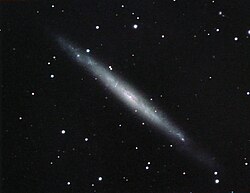中央大質量天體
中央大質量天體(CMO)是位於星系或球狀星團等巨大恆星系統中心的天體。在前者的情况下,CMO可能是超大質量黑洞或核星團,甚至兩者同時存在[1]。
 位於側向螺旋星系NGC 4244中心,類似恆星狀的核是一個中心大質量天體。 | |
質量最大的星系被認為總是包含一個超大質量黑洞(SBH);這些星系不包含核星團,CMO被確認為SBH。較小的星系通常包含一個核星團(NSC)。在大多數這樣的星系中,尚不清楚是否存在超大質量黑洞,並且CMO被識別為NSC[2]。一些星系,例如銀河系和NGC 4395,已知同時包含SBH和NSC[3]。
雖然這表明「所有」星系都有CMO,並且星系形成的常見機制導致兩者,歐空局的中紅外線科學家托斯滕·博克(Torsten Böker)觀察到一些星系似乎既沒有SBH也沒有NSC[4]。
相關條目
编辑參考資料
编辑- ^ Böker 2010a,第61頁.
- ^ 2.0 2.1 Merritt, David. Dynamics and Evolution of Galactic Nuclei. Princeton, NJ: Princeton University Press. 2013 [2021-07-20]. (原始内容存档于2020-05-14).
- ^ Nishiyama, S.; Schödel, R. Young, Massive Star Candidates Detected throughout the Nuclear Star Cluster of the Milky Way. Astronomy & Astrophysics. 2012, 549: A57. Bibcode:2012yCat..35490057N. S2CID 17865037. arXiv:1210.6125 . doi:10.1051/0004-6361/201219773.
- ^ Böker 2010b,第103頁.
書目
编辑- Böker, Torsten. Nuclear star clusters. de Grijs, Richard; Lépine, Jacques R. D. (编). Star Clusters (IAU S266): Basic Galactic Building Blocks Throughout Time and Space. IAU symposium and colloquium proceedings 266. Cambridge University Press. 2010a. ISBN 9780521764995. ISSN 1743-9213.
- Böker, Torsten. Young Massive Star Clusters in the Era of the Hubble Space Telescope. Macchetto, F. Duccio (编). The Impact of HST on European Astronomy. Astrophysics and Space Science Proceedings. Springer Science & Business Media. 2010b. ISBN 9789048134007.
| 这是一篇與天文學相關的小作品。您可以通过编辑或修订扩充其内容。 |